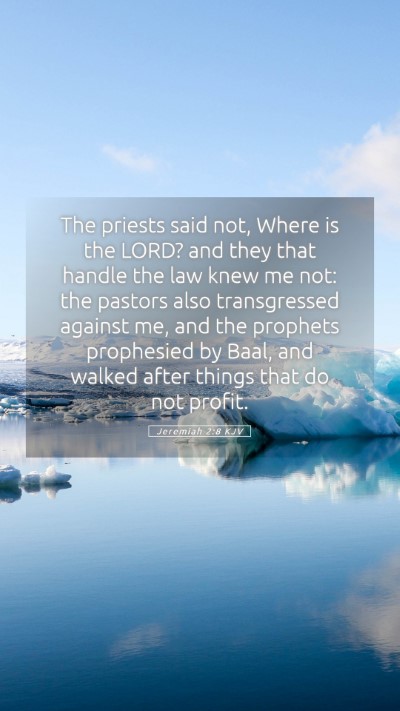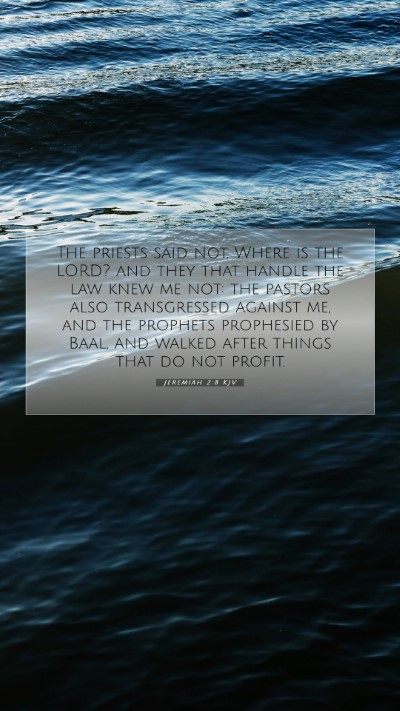Bible Verse Commentary on Jeremiah 2:8
Jeremiah 2:8 states:
"The priests did not say, 'Where is the LORD?' and those who handle the law did not know me; the rulers also transgressed against me, and the prophets prophesied by Baal and walked after things that do not profit."
This verse denotes the spiritual decline of Israel and highlights the failures of its leaders—religious and political—during a crucial period in the nation's history.
Understanding the Verse
The context of Jeremiah's prophecies is essential for a proper understanding of this verse. The prophet Jeremiah, often known as the "weeping prophet," warned Israel about the impending judgment due to their persistent idolatry and abandonment of God.
Commentary Insights
-
Matthew Henry:
Henry emphasizes that the priests' ignorance reflected a broader spiritual neglect. They were supposed to guide the people toward God, yet they failed to question His absence, leading to grave consequences for the whole nation.
-
Albert Barnes:
Barnes highlights the significance of the Law and the role of priests. He notes that the spiritual leaders didn't merely neglect their duties—they actively sought after false idols, representing a betrayal of their calling and a departure from divine truth.
-
Adam Clarke:
Clarke points out that the mention of Baal signifies the extent of Israel's idolatry. The prophets, instead of proclaiming God’s truth, endorsed false worship, further corrupting the spiritual atmosphere of the nation.
Key Themes and Applications
This verse encapsulates several vital themes for Bible study:
- The Abandonment of God:
It serves as a reminder of how easily leaders can lead others astray when they depart from the truth of Scripture.
- The Role of Spiritual Leaders:
Those in positions of authority, especially regarding spiritual matters, carry a heavy responsibility to seek God and lead accordingly.
- Consequences of Idolatry:
Baal worship symbolizes pursuing false gods over the True God, a topic still relevant in today’s context where various modern ‘idols’ can distract individuals from their devotion.
Applications for Daily Life
When reflecting on Jeremiah 2:8, consider how this scripture serves as a call to self-examination in the following ways:
- Evaluate the sources of your guidance: Are they aligning with biblical truth?
- Be aware of potential 'idols' in your life that might distract you from a genuine relationship with God.
- Encourage leaders within your community to pursue righteousness and not stray from God's Word.
Cross References
This verse is related to several other scriptural references that enhance its meaning:
- Hosea 4:6: "My people are destroyed for lack of knowledge." This verse emphasizes the consequences of ignorance in spiritual leadership.
- Ezekiel 22:26: "Her priests have violated my law and have profaned my holy things." This correlates with the failure of spiritual leaders highlighted in Jeremiah 2:8.
- 1 Kings 18:21: "And Elijah came near to all the people and said, 'How long will you go limping between two different opinions?'" This reflects the dilemma faced by those who vacillate between true worship and idolatry.
Conclusion
Jeremiah 2:8 serves as a profound warning about the pitfalls of spiritual neglect and idolatry. It prompts believers to deepen their understanding of Scripture and actively seek God’s presence in their lives. As we reflect on this verse and its implications, it is crucial to engage in consistent Bible study and analysis to enrich our faith and ensure we are following true doctrine.
In engaging with such important textual analysis, we are equipped to handle the intricacies of Bible verse meanings and deepen our Bible verse understanding. This knowledge not only nourishes personal faith but also fortifies communal worship in Bible study groups and during online Bible study.


